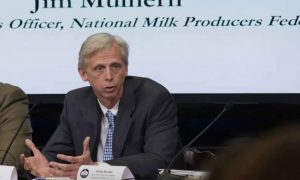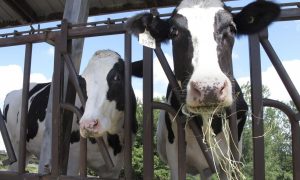
Since initiating consultations with Canada in May 2022, the United States has identified additional aspects of Canada’s measures that appear to be inconsistent with Canada’s obligations under the USMCA, and U.S. concerns have only increased.
With this new request, the United States expands its challenge of Canada’s dairy TRQ allocation measures to include Canada’s use of a market-share approach for determining TRQ allocations. Canada applies different criteria for calculating the market share of different segments of applicants, and Canada is failing to allow importers the opportunity to fully utilize TRQ quantities. The United States continues to challenge Canada’s dairy TRQ allocation measures that impose new conditions on the allocation and use of the TRQs, and that prohibit eligible applicants, including retailers, food service operators, and other types of importers, from accessing TRQ allocations. Through these measures, Canada undermines the market access that it agreed to provide in the USMCA.
“We remain very concerned by Canada’s refusal to honor USMCA commitments,” Ambassador Katherine Tai said. “Rather than work toward meeting its obligations, Canada persists in implementing new dairy policies that are inconsistent with the USMCA, and which continue to deny U.S. workers, farmers, producers, and exporters the full benefits of market access they were initially promised. We remain steadfast in our commitment to use all tools available to enforce our trade agreements and ensure that our dairy industry can offer a wide range of high-quality American products to Canadian customers.”
“Canada remains in violation of its commitments under the USMCA by not removing its trade restrictions on American dairy producers,” Secretary of Agriculture Tom Vilsack said. “Obtaining access to the Canadian market for U.S. producers and exporters is an important priority for this Administration and the U.S. Department of Agriculture and the Office of the U.S. Trade Representative will continue to work in lockstep and use every tool at our disposal to achieve market access.”
The United States has raised concerns under the USMCA previously about Canada’s dairy TRQ allocation measures. In January 2022, a USMCA dispute settlement panel found Canada’s dairy TRQ allocation measures to be inconsistent with Canada’s USMCA obligations. In response to the adverse findings of the panel, Canada introduced changes to its TRQ allocation measures, but these new policies are still inconsistent with Canada’s obligations under the USMCA. In May 2022, the United States requested consultations with Canada to address its updated dairy TRQ allocation measures. Since initiating those consultations, the United States has identified additional areas of deep concern, and this new request for consultations provides an avenue to formally address U.S. concerns. If the United States and Canada are not able to resolve the matter through consultations, the United States may request the establishment of a panel under the USMCA.
USTR officials worked closely with staff from the U.S. Department of Agriculture throughout the first dispute and since the initiation of consultations in May 2022. Both agencies will continue working together, in consultation with stakeholders, to obtain Canada’s full compliance with its USMCA dairy commitments.
Background
A tariff-rate quota applies a preferential rate of duty to an “in-quota” quantity of imports and a different rate to imports above that in-quota quantity. Under the USMCA, Canada has the right to maintain 14 TRQs on the following types of dairy products: milk, cream, skim milk powder, butter and cream powder, industrial cheeses, cheeses of all types, milk powders, concentrated or condensed milk, yogurt and buttermilk, powdered buttermilk, whey powder, products consisting of natural milk constituents, ice cream and ice cream mixes, and other dairy.
In notices to importers that Canada published in June and October 2020 and May 2021 for dairy TRQs, Canada set aside and reserved a percentage of the quota for processors and for so-called “further processors”, contrary to Canada’s USMCA commitments. As a result of this restriction, Canada was undermining the value of its dairy TRQs for U.S. farmers and exporters since entry into force of the USMCA by limiting access to in-quota quantities negotiated under the Agreement.
In January 2022, a USMCA panel agreed with the United States that Canada’s allocation of dairy TRQs, specifically the set-aside of a percentage of each dairy TRQ exclusively for Canadian processors, was inconsistent with Canada’s commitment in Article 3.A.2.11(b) of the USMCA not to “limit access to an allocation to processors.” The Panel additionally found that the Agreement makes no distinction between initial processors and “further processors”, and that therefore, the restriction in Article 3.A.2.11(b) applies to all processors, including specific subsets.
On March 2, 2022, Global Affairs Canada initiated public consultations regarding proposed changes to its policies with respect to the allocation of Canada’s USMCA dairy TRQs and explained that the changes are intended to implement the findings of the USMCA Panel. On May 16, 2022, Canada published the changes as final. The United States clearly stated that it rejects the changes Canada has implemented as a resolution to the dairy dispute because the new policies continue to be inconsistent with Canada’s obligations under the USMCA. On May 25, 2022, the United States requested dispute settlement consultations with Canada. Since initiating those consultations, the United States has identified additional aspects of Canada’s TRQ allocation measures that are inconsistent with Canada’s obligations under the USMCA.
Through its revised dairy TRQ allocation measures, Canada denies access to TRQ allocations to all types of importers except for processors, distributors, and, in some cases, further processors. This means that Canada continues to exclude other eligible applicants, such as retailers and food service operators. Additionally, Canada allocates its product-specific dairy TRQs based on a calculation of an applicant’s market share. The methodology for calculating market share differs depending on the type of applicant, which has the effect of ring-fencing large shares of the quota and limiting access to those shares exclusively to processors. For all of Canada’s dairy TRQs, Canada also requires that applicants be active during all 12 months of a 12-month reference period, potentially excluding otherwise eligible applicants, in particular new entrants. Finally, Canada’s policies for the return and reallocation of unused allocations (“turnback policies”) allow the return of allocations without potential penalty and late in the quota year. The turnback policies thus fail to ensure that there is a mechanism for the return and reallocation of unused allocations in a timely and transparent manner that provides the greatest possible opportunity for the TRQ to be filled





















